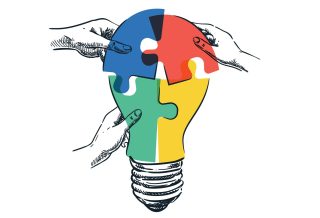COACHES CORNER
The keys to coaching outside your expertise
By Sharron Helmke
Categories: Coaching, Continuous improvement, Facilitation, Fundamentals, Learning designsApril 2021
Kindergarten and elementary classrooms never fail to bring me to a state of awe. Alphabet charts, number lines, book bins — the environment is so different from the high school English classrooms I inhabited as a teacher. The teaching is different, too, guiding inexperienced students in learning what it means to be a student while teaching key foundational concepts.
Perhaps these differences are why I enjoy coaching teachers of young children. I love hearing their thinking as they plan how to make monumental learning happen through discovery and play.
I’m aware that not everyone feels this way. In my work supporting instructional coaches, I find that many feel ill-equipped to support teachers in grade levels or subjects they’ve never taught themselves. They worry they won’t be able to help or add value to the conversation.
That’s far from true, however. In fact, stepping out of familiar territory can push us to engage in more powerful coaching. That’s because coaching outside of our own teaching experience invites us to step out of the role of expert advisor or problem-solver and stand firmly in the roles of coach and learner. It requires us to act from a place of sincere curiosity about how others think, trust in their instincts and abilities, and respect the knowledge they bring into the relationship.
Here are some ideas I’ve found useful when coaching teachers in grades or subjects less familiar to me.
Are you coaching teachers in grades or subjects less familiar to you? Here are some ideas that may help by expert coach @SharronHelmke. #LearnFwdTLP Share on XActively work to minimize anxiety about subject expertise. Remind yourself that effective coaching is not about having the answers, but about supporting the teachers’ thinking by helping them generate their own ideas, arrive at their own interpretations, and learn to better detect their own blind spots or hesitancies.
Honor the teacher’s expertise and build your own. Invite the teacher to share the exact wording of the lesson objective and describe what mastery looks like. This helps the teacher articulate thinking and simultaneously creates an objective and shared criterion for both of you when evaluating options for achieving the stated goal.
Focus your full and undivided attention to listening to understand the situation as the teacher does. Resist your mind’s urge to interpret or frame the problem as you would if it were yours to solve. Instead, actively seek to understand factors the teacher sees as relevant. What expectations or priorities is the teacher trying to address, and based on what interpretations of the situation?
Let curiosity guide your questions and wonderings. Consider using observations rather than direct questions. For example, “I noticed you mentioned …” This is an invitation for the teacher to choose how to respond, perhaps by elaborating, explaining, or even ignoring your comment. Each possible response increases your understanding of the teacher’s thinking, including where it’s clear and where it’s cloudy.
Above all, when coaching outside of your personal classroom experience, remember that the value you contribute is in supporting teachers’ critical thinking. When addressing your prompts and questions, teachers are exploring aspects of thinking that may not have been fully developed; thus, your curiosity supports their thinking. The key to coaching outside your expertise is seeking to support, rather than supplant, teachers’ knowledge and skills.
Download pdf here.

Sharron Helmke, senior vice president of professional services at Learning Forward, designs and manages the organization’s consulting service programs that support state, regional, and local organizations in translating their improvement and learning goals into custom-designed high-quality professional learning programs that result in scalable and sustainable change. During her twenty-plus years in education she has served in a variety of roles at the campus and district levels, including teacher, instructional coach, and district-based program administrator. She is an international coaching federation certified professional coach, a Gestalt professional coach, and a trauma-informed care provider, all of which inform her approach to supporting educators. She is the author of numerous professional articles, including “To make a difference for every student, give every new teacher a mentor” in the August 2022 issue of The Learning Journal.
Categories: Coaching, Continuous improvement, Facilitation, Fundamentals, Learning designs
Recent Issues
LEARNING DESIGNS
February 2025
How we learn influences what we learn. This issue shares essential...
BUILDING BRIDGES
December 2024
Students benefit when educators bridge the continuum of professional...
CURRICULUM-BASED PROFESSIONAL LEARNING
October 2024
High-quality curriculum requires skilled educators to put it into...
LEARNING TO PIVOT
August 2024
Sometimes new information and situations call for major change. This issue...












